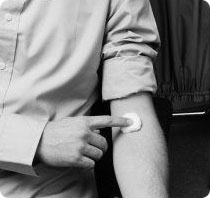

Why should I donate blood?
There are more than 1000 children suffering from Thalassaemia Major in the city. They need blood every 15 days throughout their lives. Then there are cancer patients, surgery cases, women in childbirth, accident cases – all of whom need blood. They will get blood only if you donate blood.
Can’t blood be organized from any other source?
There is no factory, no laboratory where blood can be made. Artificial blood is in an experimental stage. Animal blood cannot be given to human beings. Voluntary blood donation by a human being is the only source of blood in the universe.
How much blood does my body have?
Each one of us carries between 65 to 75 ml of blood per kg of body weight. Therefore, on an average, we carry between 4 to 6 litres of blood.
Will my body not require the blood that is donated?
Between 15 and 20 ml. of blood per kg of body weight is a buffer stock in our body. Therefore, even if you weigh just 50 kgs, you carry almost 1 litre of blood as a buffer.
How much blood is donated during blood donation?
350 ml. or 450 ml. of blood is collected from a donor during blood donation. This is a small fraction of the buffer stock of blood in ones body. In fact, a human being is allowed to donate 8 ml. per kg of his body weight.
Is it painful to donate blood?
Any discomfort or problem during or after donating is very uncommon. After the initial prick of the needle, all you feel is a gentle pressure, but no pain. The entire process of donation takes less than 10 minutes.
Is it safe to donate blood?
Yes. You will be eligible to donate blood only if you are fit and well. The needle and blood bag used to collect blood come in a sterile pack that cannot be reused. The process is therefore absolutely safe.
How much time will it take to donate blood?
The total time including the time taken for registration, donation and refreshments will be 15 minutes.
What are the criteria to be fulfilled for donating blood?
You need to be between 18 and 60 years of age, weigh more than 45 kgs., not be on medication at present, not have suffered from major illness in the recent past, and satisfy the conditions mentioned in the Blood Donor Questionnaire.
Is there any check–up done before blood donation?
Apart from checking the weight, haemoglobin, blood pressure, the blood bank staff will ask you questions about your state of health. You will not be allowed to donate blood unless found fit by the blood bank.
Can I resume my normal duties after donating blood?
You can resume your normal duties half an hour after donating blood, after consuming refreshments given to you. You should not indulge in any rigorous physical activity for 24 hours after donating blood.
How often can I donate blood?
In India, you can donate blood four times a year. There has to be an interval of 3 months between two blood donations.
Is the information provided by me on my medical history and the results of the subsequent tests done on the blood kept confidential?
The information provided by you will be kept confidential.
Are there any diet restrictions before donating blood?
You should not donate blood on an empty stomach. You should have eaten something in the last 4 hours. You should not donate blood immediately after a full meal. Wait for 45 minutes after a full meal.
Do I get a Blood Donor Card?
Every Donor gets a Blood Donor Card, which will carry the date of donation and the blood group. This will be sent to you after taking the blood to the blood bank and carrying out the grouping tests.
Should I donate blood in a drive if my blood group is Rh –ve?
People in need of blood can belong to any blood group. In any city there will be patients with both Rh+ve and Rh-ve blood groups needing blood. If the blood unit is available at one blood bank it can be moved to the hospital where the need is. Therefore, people with Rh-ve blood should also donate blood when they get an opportunity to donate blood in a drive.
Blood
Platelets
Blood Drive
Thal Minor
Thal Minor Screening Drive
Platelet Donor
Donate Blood
